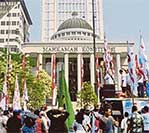CLEAR MESSAGE: The government and people will not tolerate radicals and extremists who turn Indonesians against one another
OVER the past week, a string of public statements, events and peaceful demonstrations in different parts of Indonesia have sent a clear message across the country: That Indonesia’s government and people will not stand by while a small but vocal band of radicals and extremists attempt to hijack their religion for communitarian ends, and turn Indonesians against one another.
After weeks of indecision and some ambiguous comments from political and religious leaders, the country’s Minister for Religious Affairs, Lukman Saifuddin, took the bull by the horns and publicly stated that the Indonesian government will not tolerate any violence in or outside the country, committed by Indonesians, who feel that they can trample upon the ideology of the state with impunity.
Soon after, other political and religious leaders followed suit, and the Minister for Religious Affairs invited spokesmen, theologians and activists from all religious backgrounds to the centre of government, calling upon them to help him contain the spread of religious extremism in the country.
Most worrying for the Minister were reports that some wayward Indonesians had traveled to Syria and Iraq to be part of the ISIL movement; reminding many Indonesians of the b ad old days when the country was rocked by sectarian violence between the different religious communities.
Indonesia has already suffered the same in its past when a small band of local activists left to fight a war in Afghanistan, only to return and become a disproportionately dangerous security threat back home. Never again will Indonesians allow the same mistake to be repeated twice.
That Minister Lukman boldly called upon Indonesians to join him in the struggle to defend and uphold Indonesia’s Pancasila ideology and national constitution is a case of moderate politics demonstrating a muscular edge:
For too long, politicians have simply mouthed platitudes about moderation and moderate religion, but have done little to prevent groups from attacking one another, destroying houses of worship, burning shops and houses, all in the name of their faith.
Soon after this, traditional Muslims in the city of Jogjakarta also held a peaceful demonstration calling on the people of the city to defend the values and identity of the Javanese people and their culture.
Once again, Indonesians are saying to themselves and the world that they are proud to be Muslims and Javanese at the same time, and that there is no contradiction between the two. Comparing the situation in Indonesia with so many other countries, one can see that Indonesia’s national identity is still something that many Indonesians feel worth defending.
This is also a lesson for moderates the world over, who need to realise that a moderate position is not a sign of weakness or compromise, and that in the context of the violent we live in today — where moderates have been persecuted by political groups all across Asia — the moderate position is a difficult position to hold and defend.
Moderation requires commitment and courage, and the willingness to risk the wrath of extremists from all sides. But it also requires political leadership that is enlightened and above all committed to translate those ideas to real, pragmatic politics and not simply empty slogans or sweet rhetoric.
For Indonesia in particular, a country that has experienced first hand the blight of racial, communal and religious violence a decade ago, and which suffered economically as a result of global fears about its viability and future; the government knows that it cannot afford to be silent on issues that may escalate to a dangerous boiling point.
Indonesians now are fighting back, and reclaiming both their nation and religion for themselves, and by doing so defining their present identity and future as well. That is how brave nations are born.
Article by Dr Farish Noor which appeared in New Straits Times, 11 August 2014.





